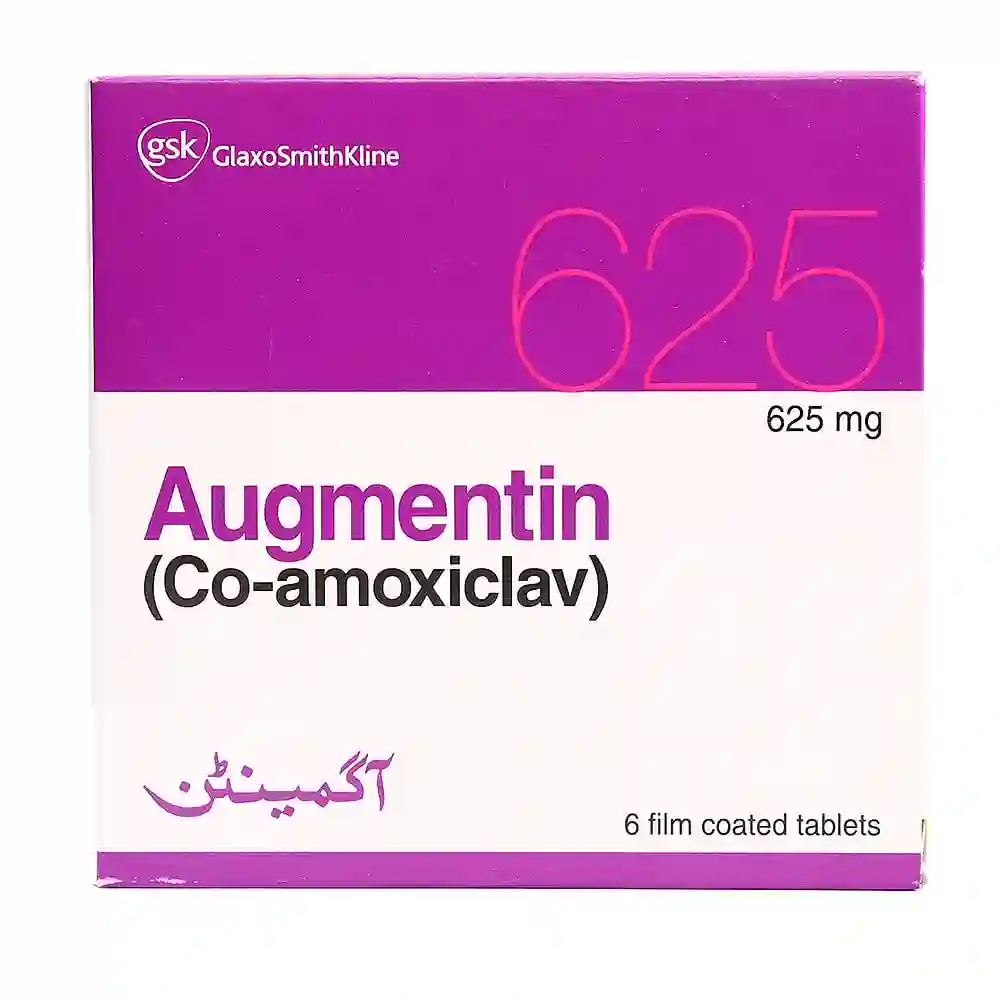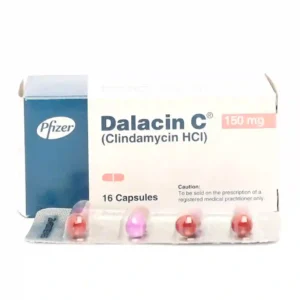Description
Augmentin 625mg Tablet
Augmentin 625mg Tablet is a potent antibiotic medication specifically formulated to combat a wide spectrum of bacterial infections. It is a first-line treatment for common and complex bacterial diseases, working by effectively eliminating the infection-causing bacteria in the body. This medication is trusted by healthcare professionals worldwide for its reliability and broad-spectrum efficacy.
This guide provides a detailed overview of Augmentin, covering everything from its mechanism of action to its safe usage. Here is a quick summary of what you will learn about this essential antibiotic therapy:
-
Comprehensive action against numerous bacterial pathogens.
-
Dual-action formula that overcomes bacterial resistance.
-
Clinically proven treatment for respiratory, urinary, and skin infections.
-
Important safety guidelines and potential adverse effects.
-
Correct dosage instructions and storage information.
-
A comparison with other common antibiotic choices.
What is Augmentin 625mg and What Are Its Primary Uses?
Augmentin 625mg is a combination antibacterial medicine containing two active ingredients: Amoxicillin (500mg) and Clavulanic Acid (125mg). It belongs to the penicillin class of antibiotics. Its primary function is to treat bacterial infections by stopping the growth of the causative bacteria. The clavulanic acid component is crucial as it inactivates the beta-lactamase enzymes produced by some bacteria, which would otherwise render amoxicillin ineffective. This synergistic action makes Augmentin a powerful solution for infections that are resistant to amoxicillin alone.
Common Bacterial Infections Treated by Augmentin
Augmentin 625mg is prescribed for a variety of bacterial conditions. Healthcare providers often recommend it for:
-
Upper Respiratory Tract Infections: Such as sinusitis (sinus infection), otitis media (middle ear infection), and tonsillitis.
-
Lower Respiratory Tract Infections: Including bronchitis and community-acquired pneumonia.
-
Urinary Tract Infections (UTIs): Such as cystitis and urethritis.
-
Skin and Soft Tissue Infections: Including cellulitis, abscesses, and wound infections.
-
Dental Infections: Like dental abscesses and periodontitis.
-
Bone and Joint Infections: Such as osteomyelitis.
What Are the Key Ingredients in Augmentin 625mg?
The therapeutic power of Augmentin 625mg comes from its two carefully balanced active components.
-
Amoxicillin (500mg): This is a broad-spectrum penicillin antibiotic. It works by attacking the cell walls of bacteria. It binds to specific proteins within the bacterial cell wall, which interrupts the final stage of wall construction. This leads to the formation of weak, defective cell walls, causing the bacteria to absorb excess water and burst, a process known as bactericidal action.
-
Clavulanate Potassium / Clavulanic Acid (125mg): Clavulanic acid itself has only weak antibacterial activity. Its primary role is to serve as a beta-lactamase inhibitor. Many bacteria produce beta-lactamase enzymes to protect themselves from penicillin-type antibiotics. Clavulanic acid binds irreversibly to these enzymes, effectively disarming them. This protection allows amoxicillin to do its job without being degraded, thereby extending its spectrum of activity against resistant bacteria.
How Should You Use Augmentin 625mg for Best Results?
For optimal therapeutic outcomes and to minimize the risk of side effects, it is imperative to use this medicine exactly as directed by your doctor.
What is the Recommended Dosage of Augmentin 625mg?
The standard adult dosage is one Augmentin 625mg tablet taken every 12 hours (twice daily) or as directed by your physician. The dosage may be adjusted based on the severity and type of infection, as well as your kidney function.
-
For mild to moderate infections: One tablet twice daily is typical.
-
For severe infections: Your doctor may increase the frequency or switch to a higher strength.
-
For children: The dosage is calculated based on body weight, and a liquid suspension form is often used.
It is generally recommended to take Augmentin at the start of a meal. This practice significantly enhances the absorption of the active ingredients and reduces the potential for gastrointestinal discomfort, such as nausea or diarrhea.
What Precautions Should You Take Before Using Augmentin?
While Augmentin is a widely used antibiotic, certain precautions are necessary to ensure its safe consumption.
Who Should Avoid Taking Augmentin?
-
Patients with a known allergy to amoxicillin, clavulanic acid, any other penicillin-type antibiotic, or any of the other ingredients in the tablet.
-
Individuals with a history of severe allergic reactions (anaphylaxis) to any other beta-lactam antibiotic (e.g., cephalosporins).
-
Patients with a previous history of liver problems or jaundice associated with taking Augmentin.
Important Drug Interactions to Discuss with Your Doctor
Inform your doctor if you are taking any of the following medications, as they may interact with Augmentin:
-
Probenecid: May increase the blood levels of amoxicillin.
-
Allopurinol: Can increase the risk of skin rashes.
-
Anticoagulants like Warfarin: Augmentin may enhance the blood-thinning effect.
-
Methotrexate: Augmentin can increase the toxicity of this drug.
-
Oral Contraceptives: The efficacy of oral contraceptives may be reduced; using an additional barrier method of contraception is often advised.
What Are the Potential Side Effects of Augmentin?
Like all medicines, Augmentin can cause side effects, although not everybody gets them. It is important to differentiate between common, less serious effects and those that require immediate medical attention.
Common and Less Serious Side Effects
These are often mild and may disappear as your body adjusts to the medicine. They include:
-
Diarrhea
-
Nausea and vomiting
-
Indigestion
-
Headache
-
Mild skin rash or itching
Taking the medicine with food can help manage gastrointestinal side effects. For diarrhea, consider probiotic supplements, but space them at least 2-3 hours apart from your antibiotic dose.
Serious Side Effects Requiring Medical Help
Contact your doctor immediately if you experience any of the following:
-
Signs of a severe allergic reaction: Swelling of the face, lips, tongue, or throat; difficulty breathing; severe skin itching or rash.
-
Persistent or severe diarrhea: Which may indicate a condition called Clostridium difficile-associated diarrhea (pseudomembranous colitis).
-
Symptoms of liver problems: Yellowing of the skin or eyes (jaundice), dark urine, severe abdominal pain.
-
Unusual bleeding or bruising.
-
Severe skin reactions: Such as blistering and peeling.
How Should You Store Augmentin 625mg Tablets?
Proper storage is vital for maintaining the potency and safety of the medication.
-
Store in a cool, dry place, away from direct sunlight and heat.
-
Keep the tablets in their original blister pack until the time of use to protect them from moisture.
-
Keep out of the reach of children and pets.
-
Do not use the tablets after the expiration date printed on the pack.
-
Do not flush medications down the toilet or pour them into a drain. Consult your pharmacist on the proper disposal method.
Who is the Manufacturer of Augmentin?
Augmentin is a renowned antibiotic brand originally developed and manufactured by GlaxoSmithKline (GSK) plc, a global, science-led healthcare company with a long-standing reputation for pharmaceutical innovation and quality. The product is manufactured in facilities that adhere to the strictest Good Manufacturing Practices (GMP) and global quality control standards, ensuring every tablet meets the required specifications for safety, efficacy, and purity.
What Are the Main Benefits of Choosing Augmentin 625mg?
Augmentin 625mg offers several distinct advantages in the treatment of bacterial infections, making it a preferred choice for physicians.
-
Broad-Spectrum Antibacterial Coverage: Its unique formulation allows it to effectively treat a wider range of bacteria compared to amoxicillin alone.
-
Overcomes Bacterial Resistance: The inclusion of clavulanic acid makes it a powerful weapon against beta-lactamase-producing resistant bacteria.
-
Proven Clinical Efficacy: It has decades of clinical evidence supporting its effectiveness for numerous common infections.
-
Convenient Dosage Regimen: The twice-daily dosing schedule promotes better patient adherence to the treatment course.
-
Global Recognition and Trust: As a GSK product, it carries the assurance of quality, research, and manufacturing excellence.
How Does Augmentin Compare to Other Antibiotics?
When choosing an antibiotic, understanding how it stacks up against alternatives is crucial. Here is a comparison table.
| Feature | Augmentin 625mg (Amoxicillin/Clavulanate) | Amoxicillin 500mg | Azithromycin 500mg | Cephalexin 500mg |
|---|---|---|---|---|
| Drug Class | Penicillin-Beta Lactamase Inhibitor | Penicillin | Macrolide | Cephalosporin |
| Spectrum of Activity | Broad-spectrum, covers many resistant bacteria | Broad-spectrum, but ineffective against beta-lactamase producers | Broad-spectrum, good for atypical bacteria | Broad-spectrum, similar to penicillin |
| Common Uses | Sinusitis, Otitis Media, Pneumonia, UTIs | Ear Infections, Strep Throat, Pneumonia | Bronchitis, Pneumonia, STIs | Skin Infections, UTIs, Bone Infections |
| Key Advantage | Effective against resistant bacteria | Well-tolerated, first-line for many infections | Convenient once-daily dosing, short courses | Good option for penicillin-allergic patients (with caution) |
| Common Side Effects | Diarrhea, Nausea | Diarrhea, Nausea, Rash | Nausea, Diarrhea, Abdominal pain | Diarrhea, Upset stomach |
| Dosing Frequency | Typically twice daily | Typically thrice daily | Typically once daily | Typically 2-4 times daily |
Frequently Asked Questions About Augmentin 625mg
Can I consume alcohol while taking Augmentin?
It is generally not recommended to drink alcohol while on any antibiotic course, including Augmentin. While it may not cause a severe reaction, alcohol can weaken your immune system and may worsen side effects like nausea and dizziness, hindering your recovery.
What should I do if I miss a dose of Augmentin?
If you remember within a few hours of the missed dose, take it as soon as you remember. If it is almost time for your next scheduled dose, skip the missed dose and continue with your regular dosing schedule. Do not take a double dose to make up for a forgotten one.
How long does it take for Augmentin to start working?
You may start to feel better within 2 to 3 days of starting the treatment. However, it is crucial to complete the entire course of antibiotics prescribed by your doctor, even if you feel well. Stopping early can lead to a relapse of the infection and contribute to antibiotic resistance.
Is Augmentin safe to use during pregnancy or breastfeeding?
Augmentin should be used during pregnancy and breastfeeding only if clearly prescribed by a doctor after assessing the benefits and potential risks. While it is generally considered compatible, a medical professional must make the final decision.
Why is Augmentin causing me diarrhea?
Diarrhea is a common side effect of Augmentin because the antibiotic can disrupt the natural balance of good and bad bacteria in your gut. To manage this, eat plain yogurt with live cultures or take probiotic supplements (spaced apart from your dose). If the diarrhea becomes severe, watery, or contains blood, contact your doctor immediately.
Can Augmentin be used for a tooth infection or abscess?
Yes, Augmentin is a very common and effective prescription for dental abscesses and other tooth infections caused by bacteria. Its broad-spectrum activity makes it suitable for the mixed bacteria often found in oral infections.

 Cart is empty
Cart is empty 




Reviews
There are no reviews yet.